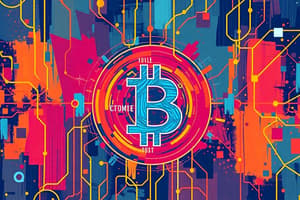Podcast
Questions and Answers
What is a primary function of blockchain technology?
What is a primary function of blockchain technology?
- To create a temporary ledger
- To limit access to data
- To maintain a secure and decentralized record of transactions (correct)
- To centralize data management
Which of the following best describes the process of transaction validation in blockchain?
Which of the following best describes the process of transaction validation in blockchain?
- Transactions are instantly processed with no storage needed
- Transactions are validated through mining or consensus mechanisms (correct)
- Transactions are approved without any checks
- Transactions require a simple confirmation from one authority
How does blockchain technology enhance security and trust?
How does blockchain technology enhance security and trust?
- By preventing alteration of records through data distribution across nodes (correct)
- By keeping all data stored in a single location
- By requiring manual verification of all entries
- By allowing any node to alter data
What is meant by immutable data in the context of blockchain?
What is meant by immutable data in the context of blockchain?
What mechanism is commonly used in blockchain to validate blocks of transactions?
What mechanism is commonly used in blockchain to validate blocks of transactions?
Which statement best characterizes the difference between blockchain and Bitcoin?
Which statement best characterizes the difference between blockchain and Bitcoin?
What challenge is often associated with blockchain technology?
What challenge is often associated with blockchain technology?
Which aspect does blockchain leverage to ensure transparency?
Which aspect does blockchain leverage to ensure transparency?
What is one key benefit of blockchain technology in financial services?
What is one key benefit of blockchain technology in financial services?
How does blockchain support the retail and luxury resale market?
How does blockchain support the retail and luxury resale market?
Which limitation of blockchain is related to transaction speeds?
Which limitation of blockchain is related to transaction speeds?
What is a primary environmental concern associated with blockchain technology?
What is a primary environmental concern associated with blockchain technology?
Which issue does NOT typically hinder the interoperability of blockchain networks?
Which issue does NOT typically hinder the interoperability of blockchain networks?
What primarily enables user interaction in the Metaverse?
What primarily enables user interaction in the Metaverse?
The term 'Metaverse' was first coined in which context?
The term 'Metaverse' was first coined in which context?
What approach is necessary for fostering blockchain adoption amid regulatory uncertainty?
What approach is necessary for fostering blockchain adoption amid regulatory uncertainty?
What is the primary goal of the Metaverse?
What is the primary goal of the Metaverse?
Which technology is essential for high-quality data transmission in the Metaverse?
Which technology is essential for high-quality data transmission in the Metaverse?
What type of devices provides an immersive experience within the Metaverse?
What type of devices provides an immersive experience within the Metaverse?
How does the Metaverse utilize blockchain technology?
How does the Metaverse utilize blockchain technology?
What is projected regarding user adoption of Metaverse technologies by 2040?
What is projected regarding user adoption of Metaverse technologies by 2040?
What role do diverse protocols play in the Metaverse?
What role do diverse protocols play in the Metaverse?
Which statement best describes how users can interact in the Metaverse?
Which statement best describes how users can interact in the Metaverse?
What is expected to drive innovation in sectors related to the Metaverse?
What is expected to drive innovation in sectors related to the Metaverse?
Flashcards are hidden until you start studying
Study Notes
Blockchain Overview
- A blockchain is a distributed ledger shared across multiple nodes in a computer network, providing security and transparency.
- Primarily known for supporting cryptocurrencies, blockchain ensures data immutability across various industries.
How Blockchain Works
- Blockchain Structure: Decentralized database ensuring transparency and security via distributed ledger technology.
- Transaction Process: Involves initiation, storage in a memory pool, block closure, encryption, and validation through mining or consensus mechanisms.
- Proof-of-Work: Mining validates blocks by solving cryptographic puzzles, maintaining the integrity of the blockchain.
Blockchain Decentralization
- Data is distributed across multiple network nodes, enhancing redundancy and integrity.
- Prevents unilateral alterations to records, ensuring security and trustworthiness.
Bitcoin vs Blockchain
- Bitcoin is a cryptocurrency that uses blockchain technology, but blockchain extends beyond cryptocurrencies to other applications.
Blockchain Applications
- Financial Services: Enables real-time transactions, simplifies operations, and executes smart contracts, enhancing financial efficiency.
- Retail and Luxury Resale: Utilization of NFTs promotes customer engagement and ensures authenticity of luxury goods.
- Marketing and Healthcare: Increases security and transparency in marketing, combats fraud in digital advertising, and optimizes healthcare processes.
Blockchain Limitations
- Scalability Challenges: Public blockchains face limited transaction processing capabilities affecting speed and cost, hindering adoption.
- Energy Consumption: Energy-intensive operations raise environmental concerns, prompting the need for more sustainable mechanisms.
- Interoperability Hurdles: Varied blockchain protocols restrict seamless interactions, limiting the technology's potential.
- Regulatory Uncertainty: Evolving regulations pose challenges for adoption, requiring a balance between innovation and compliance.
Introduction to Metaverse
- The Metaverse is a 3D virtual space enabling users to connect and engage in real-world activities through technologies like VR, AR, and cryptocurrencies.
Origin and Definition
- The term "Metaverse" combines "meta-" (beyond) and "verse" (universe), introduced by Neal Stephenson in "Snow Crash" (1992).
- Serves as a virtual reality space for socialization, gaming, and work, influencing both physical and digital realms.
Features and Functions
- Aims to facilitate social interactions through permanent virtual worlds, utilizing blockchain and augmented reality.
- Users can engage in real-life activities such as owning digital assets and properties within the Metaverse.
Technologies in Metaverse
- High-Speed Networks: Relies on advanced 5G & 6G networks for efficient high-quality data transmission.
- Access Devices: AR, VR, and mixed reality devices are crucial for immersive user experiences in Metaverse applications.
- Diverse Protocols: Applications utilize various protocols and programming languages to ensure compatibility across platforms.
- Blockchain-Based Marketplaces: Features decentralized marketplaces where users trade virtual goods using NFTs.
The Future of Metaverse
- Advancing Investment: Increased investment in emerging technologies is predicted to drive innovation related to the Metaverse.
- Increased User Adoption: User adoption is forecasted to rise significantly by 2040, reflecting greater societal integration of Metaverse technologies.
Studying That Suits You
Use AI to generate personalized quizzes and flashcards to suit your learning preferences.




